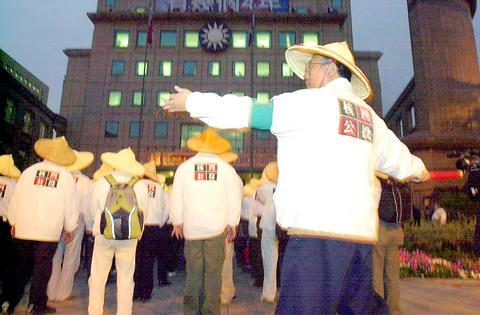Minister of Foreign Affairs Eugene Chien (
In his first clear explanation of the US attitude toward the referendum since the meeting between US President George W. Bush and Chinese Premier Wen Jiabao (
The US said voting on the two referendum issues proposed by President Chen Shui-bian (

PHOTO: CHIANG YING-YING, TAIPEI TIMES
The US said a referendum that cannot change the situation or China's policy would be meaningless, Chien said.
Chien made the remarks in a breakfast meeting with lawmakers from the pro-independence Taiwan Solidarity Union (TSU), who protested to the American Institute in Taiwan over Bush's public rebuke of Chen during his meeting with Wen.
National Security Council Deputy Secretary-General Antonio Chiang (
Chiang said that although the US did not disapprove of the referendum asking China to dismantle its missiles targeting Taiwan, it said a more consequential item should be voted on.
"Otherwise the US would view the referendum issue as incomplete," Chiang said.
The US has said it hoped Taiwan could offer to hold a referendum on direct links between Taiwan and China -- transportation, commerce and postal service -- if China agreed to remove its missiles, according to TSU whip Liao Pen-yen (廖本煙), adding the plan would provide Beijing with an incentive to remove the missile threat.
Liao said the US request would make Taiwan's referendum more meaningful.
"The US proposal [on direct links] does not involve the independence or unification problem," Liao said.
Commenting on the development of relations between China, Taiwan and the US after the Bush-Wen meeting, Chien insisted that "Taiwan-US ties remain unaffected."
China-US relations, Chien said, have moved out of the past ambiguity and proceeded to clarity. The two countries have turned from strategic competitors to strategic partners, he said.
Facing worries about the future of Taiwan-US relations, Chiang said the government is "contemplating the last step and making the best preparations."
Addressing TSU lawmakers' concerns about whether China would use force against Taiwan if a referendum is held, Chiang said things so far appeared "safe enough."
Both Chien and Chiang said the US, in order to maintain cross-strait stability, would not alter its policy, adding that it does not wish to see any unilateral moves by Taiwan or China to change the status quo.
Also See Story:
Demonstrators criticize Bush for bowing to China

TRAGEDY STRIKES TAIPEI: The suspect died after falling off a building after he threw smoke grenades into Taipei Main Station and went on a killing spree in Zhongshan A 27-year-old suspect allegedly threw smoke grenades in Taipei Main Station and then proceeded to Zhongshan MRT Station in a random killing spree that resulted in the death of the suspect and two other civilians, and seven injured, including one in critical condition, as of press time last night. The suspect, identified as a man surnamed Chang Wen (張文), allegedly began the attack at Taipei Main Station, the Taipei Fire Department said, adding that it received a report at 5:24pm that smoke grenades had been thrown in the station. One man in his 50s was rushed to hospital after a cardiac arrest

A car bomb killed a senior Russian general in southern Moscow yesterday morning, the latest high-profile army figure to be blown up in a blast that came just hours after Russian and Ukrainian delegates held separate talks in Miami on a plan to end the war. Kyiv has not commented on the incident, but Russian investigators said they were probing whether the blast was “linked” to “Ukrainian special forces.” The attack was similar to other assassinations of generals and pro-war figures that have either been claimed, or are widely believed to have been orchestrated, by Ukraine. Russian Lieutenant General Fanil Sarvarov, 56, head

SAFETY FIRST: Double the number of police were deployed at the Taipei Marathon, while other cities released plans to bolster public event safety Authorities across Taiwan have stepped up security measures ahead of Christmas and New Year events, following a knife and smoke bomb attack in Taipei on Friday that left four people dead and 11 injured. In a bid to prevent potential copycat incidents, police deployments have been expanded for large gatherings, transport hubs, and other crowded public spaces, according to official statements from police and city authorities. Taipei Mayor Chiang Wan-an (蔣萬安) said the city has “comprehensively raised security readiness” in crowded areas, increased police deployments with armed officers, and intensified patrols during weekends and nighttime hours. For large-scale events, security checkpoints and explosives

PUBLIC SAFETY: The premier said that security would be tightened in transport hubs, while President Lai commended the public for their bravery The government is to deploy more police, including rapid response units, in crowded public areas to ensure a swift response to any threats, President William Lai (賴清德) said yesterday after a knife attack killed three people and injured 11 in Taipei the previous day. Lai made the remarks following a briefing by the National Police Agency on the progress of the investigation, saying that the attack underscored the importance of cooperation in public security between the central and local governments. The attack unfolded in the early evening on Friday around Taipei Main Station’s M7 exit and later near the Taipei MRT’s Zhongshan